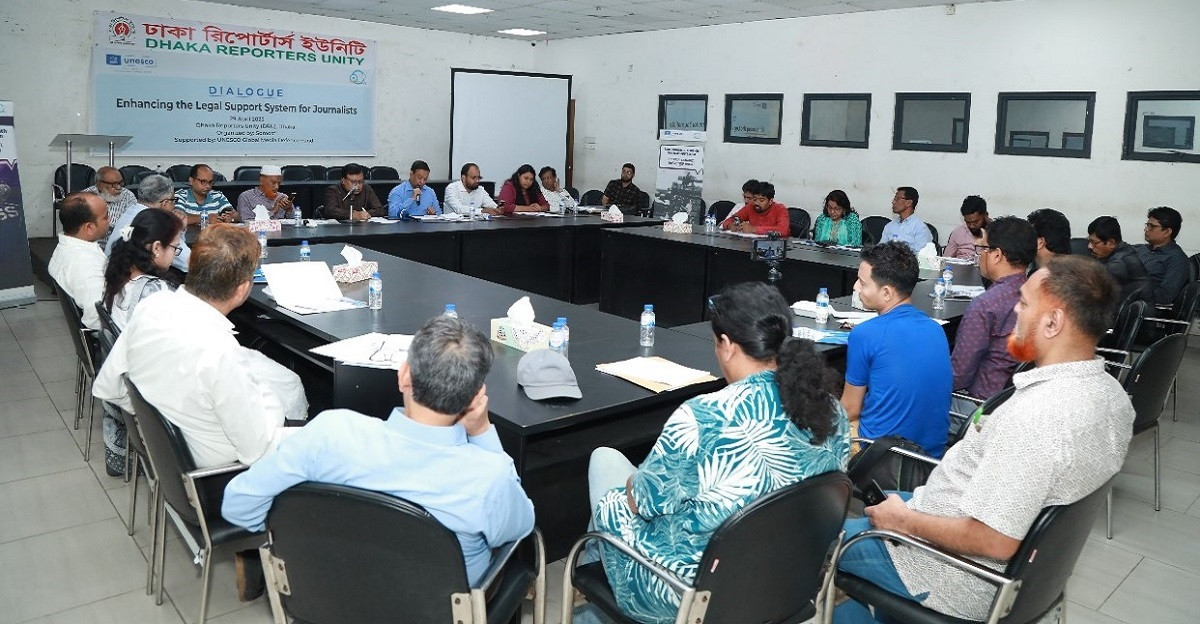Dialogue held on establishing help desk for journalists’ safety
Daily Sun Report, Dhaka
Published: 29 Apr 2025

A dialogue was held Tuesday to discuss the structure for a proposed Help Desk, which is aimed at enhancing the legal protections for journalists in Bangladesh.
Journalist leaders and legal service providers took part in the dialogue held at the Shafiqul Kabir Milon Auditorium, Dhaka Reporters Unity (DRU), Dhaka, with support from the UNESCO Global Media Defence Fund.
The event focused on the organizational structure and framework of operations of the proposed Help Desk. The participants welcomed the initiative as a good step towards safeguarding journalists and pledged their active cooperation to making the project viable.
Mir Masruruzzaman, chief news editor at Channel i, gave the welcome remarks, mentioning the background and necessity of the Help Desk. He is also the executive director of the non-profit "Society of Media and Suitable Human-Communication Techniques (SoMaSHTe)."
The dialogue was facilitated by Reaz Ahmad, editor of Dhaka Tribune, and participated by Obaidur Rahman Shaheen, president, BFUJ; Kader Gani Chowdhury, general secretary, BFUJ; Md Shahidul Islam, president, Dhaka Union of Journalists; Mainul Hasan Sohel, general secretary, DRU; MM Badsha, general secretary, Crime Reporters Association; Ilyas Hossain, member secretary, Broadcast Journalists Center; Nighat Seema, deputy director, Bangladesh National Women Lawyers' Association (BNWLA); Md Barkat Ali, director (Legal), BLAST; and Advocate Sujoy Chowdhury of Ain Seba; among others.
Speakers noted that the proposed desk would help create a safer and more protective environment for journalists in Bangladesh.
Journalist leaders reaffirmed their dedication to press freedom and human rights, emphasising collaboration and affiliated cooperation to protect journalists through the Help Desk. Representatives from legal assistance agencies indicated the Help Desk would be crucial in providing legal help, advice, and proper assistance to journalists, saying they are ready to be allies in this endeavour.
It was announced that the Help Desk, as envisioned, would be made up of representatives from journalist associations and legal service agencies. The data collected from journalists seeking legal aid would be forwarded to the respective legal service providers. Where appropriate, referrals would be made with regards to district- or region-level legal services.
The organisers also expected that when the project would be realised, the Help Desk model would function as self-sufficient entity with the engaged participation of journalist associations. This would secure a safer, more supportive, and more effective working culture for journalists.
In Bangladesh, journalists often face legal issues when reporting about human rights violations, corruption, land grabbing, or politically sensitive issues. For this reason, the initiative to establish a rapid, responsive, and effective legal support mechanism through the Help Desk would fill a critical gap.

